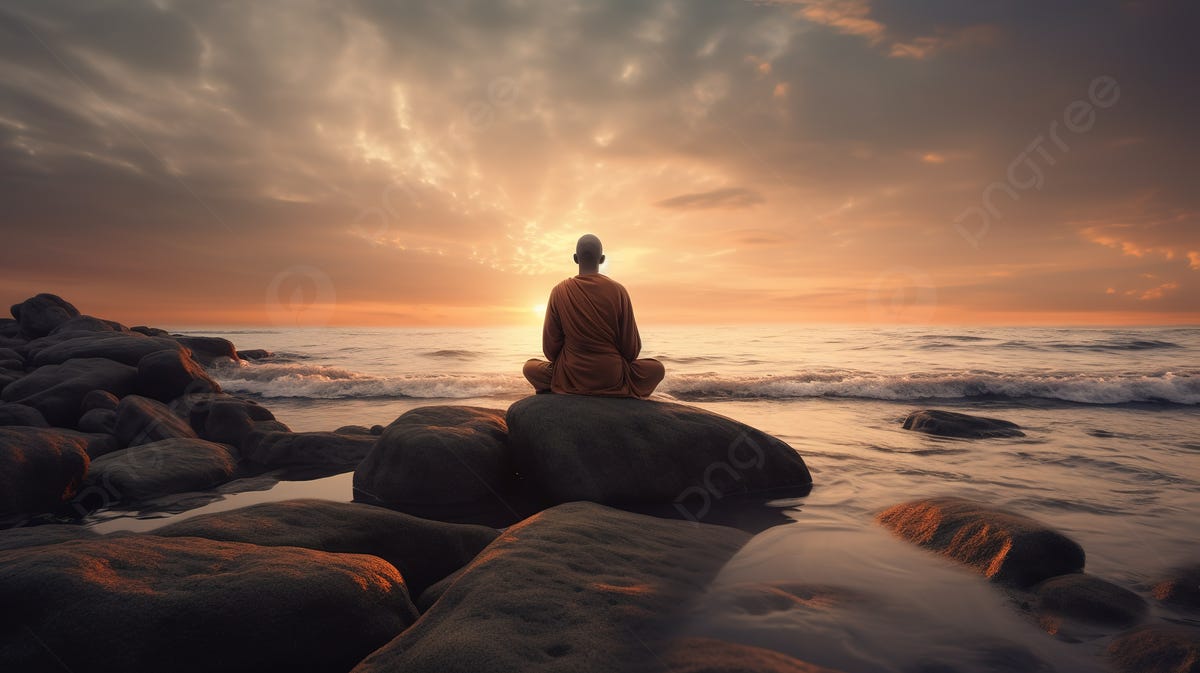The Buddha stated that purities and impurities depend on ourselves; no one can purify another person. He emphasised that peace and happiness can only be found within and cannot be sought externally. By affirming these two points, he made it clear that whatever you're seeking is already within you. Unfortunately, we often spend our lives looking outside ourselves for fulfilment. This pursuit entangles us in what Buddhism identifies as the eight worldly concerns: the four attachments—pleasure, fame, gain, and praise—and their opposites—blame, pain, insignificance, and loss. The more we focus outward, the less we can effect change. True change can only occur when we turn our attention inward.
Many of us pray to gods or rely on a higher power, hoping that our beliefs will transform our lives. However, life is about self-exploration and understanding what makes you tick.
When thoughts arise, we should allow them to guide us without trying to control or judge them. Often, strong emotions lead us into a blame game, where we seek external causes for our feelings. In reality, everything lies within us.
If you want to find happiness, look inside yourself. While external sources may offer fleeting moments of joy, these experiences are temporary. When they fade, we often feel suffering, discontentment, and dissatisfaction. We then chase after more happiness, navigating a world filled with brief highs, like scrolling through Instagram reels for instant gratification. But these moments are not true living; they are illusions that cannot lead to real happiness.
True happiness cannot be found in an app, online or outside yourself. It is only by exploring your inner self that you will understand what is happening within you and discover who you truly are. Only then can you achieve lasting peace of mind.
Life, in this respect, is simple. It is about taking responsibility for who you are and what you do, rather than constantly focusing on others. It's not about wondering why others do what they do or judging and criticising them. The more you engage in judgment and criticism, the less likely you are to change. This negative thought process leads to negative feelings. Remember, there is only one truth, and that truth is within you.
Buddha taught a path for us to follow 2,600 years ago, yet we still struggle to fully embrace it. Occasionally, we spend some time looking inward and practice a bit of meditation, expecting these efforts to transform our world and provide us with all the answers. But that expectation is misguided.
The path Buddha offered includes meditation, mindfulness, and reflection. Meditation isn't about chakras or Kundalini; it's about self-exploration. It's an opportunity to understand who you are, what drives you, your biases, and your limiting beliefs. Meditation invites you to look within, focusing on your mind, thoughts, feelings, and behaviours.
Mindfulness involves being aware of your current actions. What are you thinking? What emotions are you experiencing? What is happening around you? This awareness provides insight into your identity, revealing your thought processes and offering a chance for change. It highlights your emotional state, emphasising the importance of the present moment, rather than fixating on past events or future possibilities. By practising mindfulness, you can avoid constant distractions. Our minds are easily entertained, but such distractions—whether from mobile phones, gossiping, or judging—do not serve us. Instead, cultivate mindfulness and resist the urge to be diverted by external influences.
Reflection practices involve reviewing your day to strive for improvement tomorrow. Assess what has worked for you and what hasn’t. Reinforce the positive behaviours that resonate with your true self, as they contribute to your wisdom and identity. Simultaneously, consider what didn’t work and explore better approaches for similar situations in the future.
Meditate and turn your attention inward. Take a moment to breathe deeply, calm yourself, and get to know who you truly are. We often seek to understand everything about others while neglecting our own self-awareness. Recall Buddha's wisdom: purities and impurities reside within you, and only you can address them. True happiness and peace of mind are found within; no one else can provide them. When you cultivate this inner happiness and peace, it becomes part of your essence—nobody can take it from you because it becomes your wisdom. Therefore, meditate not just to check off ten minutes a day on a list, but to genuinely learn and grow during that time.
In your meditation, reflect deeply on who you are. Take the time to understand yourself, to introduce yourself to who you are.
Throughout the day, practise mindfulness. Periodically return to the present moment by asking yourself: What am I thinking? How do I feel? What’s happening around me right now? How can I navigate this situation? At the end of the day, sit in quiet reflection. Consider what went well and how you can build on those successes. Similarly, evaluate what didn’t work without judgement; instead, think about how you might approach those challenges differently in the future. By incorporating these practices into your daily routine, you will learn about yourself and foster personal growth, becoming a better version of yourself each day. Over time, this commitment will lead to a peaceful mind and an unshakeable inner happiness.
Stop seeking your happiness externally. Avoid blaming, criticising, or judging others, and begin looking inward. Take responsibility for your life—it is yours alone. It is not your parents’ life, your friends’ lives, or your partner’s life; it is your responsibility. Everything you do with your body, speech, and mind is solely up to you. Embrace meditation, maintain awareness throughout the day, and engage in nightly reflection. Only then will transformation begin. When you truly understand who you are, you will find the peace and happiness you seek.
Now, take a moment to close your eyes and reflect on what I’ve shared.
If you would like to become a supporter of Buddhism Guides work, such as podcasts, blogs, videos and guided meditation practices, please visit here. You can support for as little as $2 a month. You can find my content on these apps: InsightTimer and RoundGlass Living.
Find my books here – worldwide or India only




Wonderful article Venerable, the inner search is such a great aspect of Buddhism